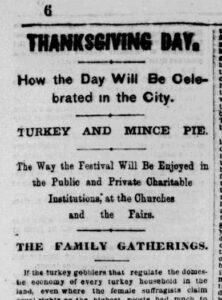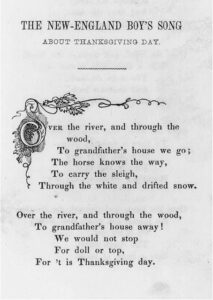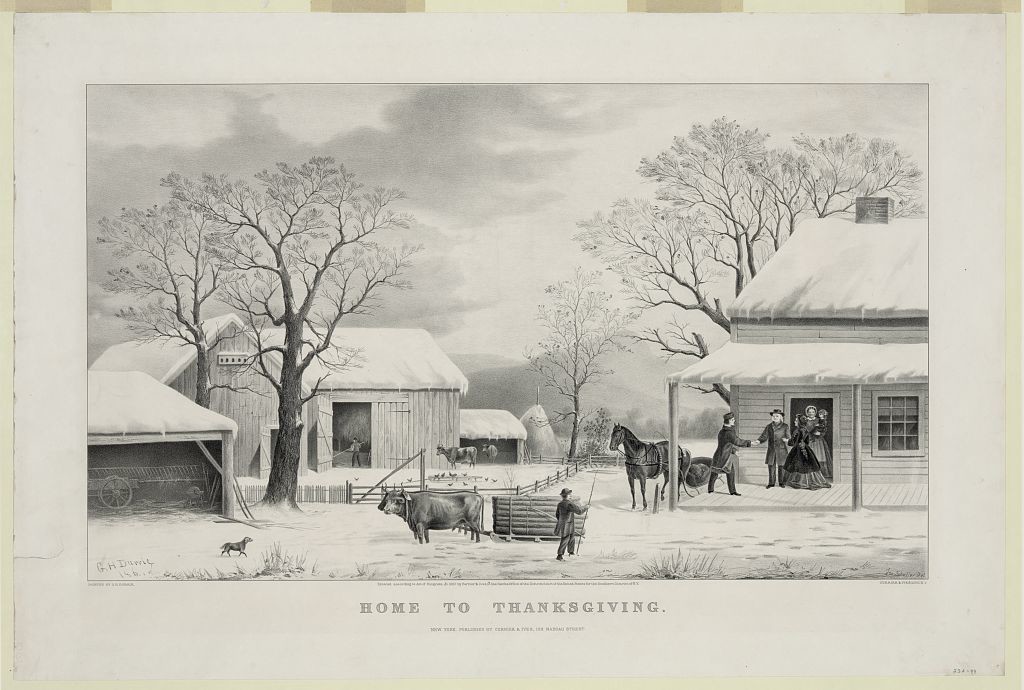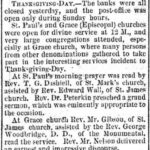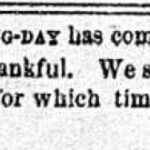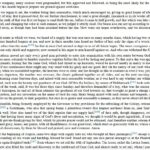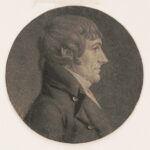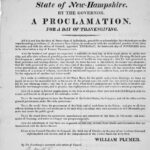Are you ready for some jollification?
President Ulysses S. Grant’s sixth Thanksgiving Day proclamation (from Pilgrim Hall Museum):
THANKSGIVING DAY 1874
BY THE PRESIDENT OF THE UNITED STATES OF AMERICA – A PROCLAMATION
We are reminded by the changing seasons that it is time to pause in our daily avocations and offer thanks to Almighty God for the mercies and abundance of the year which is drawing to a close. The blessings of free government continue to be vouchsafed to us; the earth has responded to the labor of the husbandman; the land has been free from pestilence; internal order is being maintained, and peace with other powers has prevailed.
It is fitting that at stated periods we should cease from our accustomed pursuits and from the turmoil of our daily lives and unite in thankfulness for the blessings of the past and in the cultivation of kindly feelings toward each other.
Now, therefore, recognizing these considerations, I, Ulysses S. Grant, President of the United States, do recommend to all citizens to assemble in their respective places of worship on Thursday, the 26th day of November next, and express their thanks for the mercy and favor of Almighty God, and, laying aside all political contentions and all secular occupations, to observe such day as a day of rest, thanksgiving, and praise.
In witness whereof I have hereunto set my hand and caused the seal of the United States to be affixed.
Done at the city of Washington, this 27th day of October, A.D. 1874, and of the Independence of the United States of America the ninety-ninth.
U.S. GRANT
In its 1874 Thanksgiving Day issue The New York Herald seemed to be calling for a less formally religious Thanksgiving:
If the turkey gobblers that regulate the domestic economy of every turkey household in the land, even where the female suffragists claim equal rights on the highest roosts, had much to say about what presidents and governors should and should not do, the American people would certainly never hear of a proclamation for a national Thanksgiving; but it so happens that as yet universal suffrage has not been made to apply to all the animal creation, and to-day, therefore, the big politicians can enjoy their Thanksgiving dinner without fear of being defeated at the next election by the solid turkey vote of the rural districts. In fact, to-day will be a day of much feasting and probably of some praying throughout the length and breadth of the Union; for it is undeniable that of late years Thanksgiving Day has come to be looked upon by the people generally as
A HOLIDAY OF MERRYMAKING
rather than a holy day set apart for the exclusive benefit of long-winded preachers who while delivering their sermons are all the time wondering within themselves whether the turkey is being overdone at home, and who once upon a time considered the day and all its appurtenances as a sort of special property of their own.
In the long ago New England alone celebrated a specified day in the year as a day of general thanksgiving, the people of the other States not considering it worth their while to go to church for any particular purpose more than once a week, but during the past few years Thanksgiving Day has become, next to New Year’s Day, the greatest and the most generally observed holiday of the whole year. Its religious character in the days of the Puritans made it as sacred in the eyes of the God-fearing followers of Bradford and his successors as Christmas Day has always been with the Catholics, and, indeed, if the statements of some chroniclers of the “truth and nothing but the truth” can be relied upon, one of the chief motives, if not the principal motive, which led to the establishment of the day as a religious holiday by the Puritans was to “deter the unwary from falling into the superstitious practices of the Papists,” one of which was the observance of the 25th of December as the day when the Saviour was born into the world. Be that as it may, Thanksgiving Day has a history peculiarly its own, and it may surprise
THE STRAIGHT LACED NEW ENGLANDERS
who may regard the merrymakings now deemed inseparable from a proper celebration of the day as so many unpardonable crimes, and who may cling to the notion that it should be a day of extra religious practices alone, to learn that the very first Thanksgiving Day in New England, of which there is record, was celebrated with all sorts of merrymakings – that in fact it took the celebrators over three days to get through with their jollifications. This thanksgiving took place, of course, in Massachusetts, when Bradford was the governor. It was in 1621. He and his had suffered much, and had worked hard in the fields and had prayed as hard as they had worked, and as a result they were blessed with a good harvest. So one day four men, by order of the Governor, were sent out on a shooting expedition, “so that after a special manner” they “might rejoice together” after they “had gathered of their labors.” In those days there must have been splendid shooting, for the four sportsmen succeeded in bagging enough game to last Bradford’s company almost a week.
It is true that it is recorded as historical fact that there was “a little help aside,” besides the game secured by the huntsmen, but as to whether this consisted of pâtés de foie gras venison steaks or quail on toast, the veracious historian preserves a most ominous silence, and this silence is all the more to be deplored in view of the circumstance which he relates that while the Governor and his friends were enjoying the feast they were visited by King Massasoit and ninety of his men, whom they entertained for three mortal days. The inevitable conclusion is that either the four men must have been Irish riflemen of some ancient Rigby school or the Indians had
VERY POOR APPETITES.
A bilious historian of the present day has cruelly suggested that “the little help aside” was a big demijohn of whiskey, but every one who knows anything knows that Massasoit was a Good Templar in his way and a member in good standing of the church, and that Bradford had no stomach for evil sports of any kind. Three years after this little festivity of the Bradford company their Thanksgiving occurred. It was unlike the first in many respects, for there is no mention made by the faithful chronicler, Winslow, of any extra religious services having been held by the company, whereas on the second occasion there was quite a revival. Instead of making too merry from the start the Governor issued a proclamation that the people should humble themselves before the Lord “by fasting and prayer.” This, by the way, was considered necessary, as the crops had been poor and a drought had prevailed. The fasting and praying had a good effect, it is said, and when the showers of rain came, as an answer from on high, the Governor appointed the day following the general wetting as a day of thanksgiving, when they “returned
GLORY, HONOR AND PRAISE,
with all thankfulness to God, who had dealt so graciously with them,” and feasted splendidly afterward.
It will thus be seen that the idea of some people now-a-days, that Thanksgiving Day, if observed strictly in accordance with the old time customs, ought to be a day of fasting and prayer to the exclusion of feasting is an erroneous one, and that the originators of the Thanksgiving Day practice took good care that there should be merrymaking and general jollification, even if they had to set a special day for it after the prayer and fasting was at an end. From Bradford’s time down the idea of one day in the year being designated as a day of thanksgiving was faithfully adhered to in New England, and gradually, in years, it became the custom of the governors of States, outside of New England, to call on the people of their respective States to meet in their cuurches [sic] on a certain fixed day and return thanks to God for His blessings during the year. It often happened, however, that the day was not the same in the various States, and, indeed, some States never knew what it was to have a Thanksgiving Day at all. But the war of the rebellion, which brought about so many changes, brought about a change in this particular, and since the year when President Lincoln issued his proclamation fixing a day which the people of “all the States” were requested to observe as a day of thanksgiving, the Governors, even of the New England States, have come to regard it as a national holiday instead of a local one, and only issue their proclamations after the President has issued his fixing upon the day to be observed.
As has already been said, Thanksgiving Day is now, with but one probable exception, the best observed holiday in the Union. This certainly not because of its religious character, for apart from the morning services held in the churches, as a matter of form more than anything else, it cannot be considered a religious day; but the secret of its universal observance lies in the fact that as year succeeds year it becomes more and more sacred in the eyes of the people as
A FAMILY FESTIVAL.
What had been but the practice on Thanksgiving Day of a few families whose members were scattered during the greater part of the year, has become the practice of every family in the land – a day of reunion, when the grandfather and grandmother and their children and their children’s children meet under the same roof, and sit at the same table, and gather about the same fireside and thank God that He has allowed them, after the dreary separation of a long year, to gaze upon one another’s faces once again and to find that the love which bound them all so closely together in the long ago, when some were mere children, has only been made all the stronger and deeper by the separation itself. It is this feature of the day that makes it a holy one in the eyes of the great majority of the people, and it is this that makes the old and the young look forward to its coming every year with the longing of the child who, after being far away from home at school, sees the vacation draw within a few days of being at hand. And if there was nothing else that stamps the day with a holy impress, this custom of the gathering together of the family every year is of itself sufficient to make it a sacred day in the annals of the nation. Could anything be more beautiful, more wholesome in its effects than this yearly family reunion? We are but a nation of
RESPECTABLE VAGABONDS
at the best, and the ties of home bind us none too …
[… I can’t read the next few lines and I’m also jumping ahead]
… A custom, then, like this good one of the gathering together of all the family is a holy one, and the hold it has of late years taken upon
THE POPULAR HEART
must continue to grow stronger rather than weaker through the course of the time to come. To-day everywhere, from out the family reunions which will take place (and where will they not take place?), where the very old and the very young will meet for the first time; where the sons and daughters and grandchildren will assemble from far and near about the family table once more, there will go up from loving hearts thanks, sweeter in the sight of God than all the formal services of all the ministers in all the churches put together – the thanks of the young and aged in thousands of families blended in one unspoken prayer. …
The article goes on to mention that there will be “Dark Shadow” in homes where an empty chair signifies the death of a family member during the year, and the very poor will have nothing to be thankful for unless some of the rich help them out. Several charities will be working throughout the day to help those in need. There were many Protestant, Catholic, and Jewish services scheduled.

